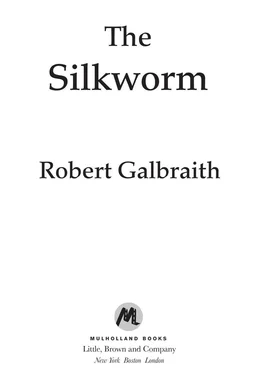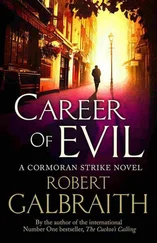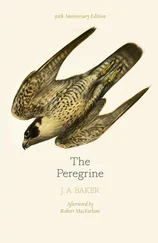Robert Galbraith - The Silkworm
Здесь есть возможность читать онлайн «Robert Galbraith - The Silkworm» весь текст электронной книги совершенно бесплатно (целиком полную версию без сокращений). В некоторых случаях можно слушать аудио, скачать через торрент в формате fb2 и присутствует краткое содержание. Год выпуска: 2014, ISBN: 2014, Издательство: Mulholland Books, Жанр: Старинная литература, на английском языке. Описание произведения, (предисловие) а так же отзывы посетителей доступны на портале библиотеки ЛибКат.
- Название:The Silkworm
- Автор:
- Издательство:Mulholland Books
- Жанр:
- Год:2014
- ISBN:9780316206877
- Рейтинг книги:3 / 5. Голосов: 2
-
Избранное:Добавить в избранное
- Отзывы:
-
Ваша оценка:
- 60
- 1
- 2
- 3
- 4
- 5
The Silkworm: краткое содержание, описание и аннотация
Предлагаем к чтению аннотацию, описание, краткое содержание или предисловие (зависит от того, что написал сам автор книги «The Silkworm»). Если вы не нашли необходимую информацию о книге — напишите в комментариях, мы постараемся отыскать её.
The Silkworm — читать онлайн бесплатно полную книгу (весь текст) целиком
Ниже представлен текст книги, разбитый по страницам. Система сохранения места последней прочитанной страницы, позволяет с удобством читать онлайн бесплатно книгу «The Silkworm», без необходимости каждый раз заново искать на чём Вы остановились. Поставьте закладку, и сможете в любой момент перейти на страницу, на которой закончили чтение.
Интервал:
Закладка:
Elizabeth Tassel’s literary agency lay in a mostly residential mews of dark brick, a surprisingly quiet cul-de-sac off busy Gower Street. Strike pressed a doorbell beside a discreet brass plaque. A light thumping sound ensued and a pale young man in an open-necked shirt opened the door at the foot of red-carpeted stairs.
“Are you the private detective?” he asked with what seemed to be a mixture of trepidation and excitement. Strike followed him, dripping all over the threadbare carpet, up the stairs to a mahogany door and into a large office space that had once, perhaps, been a separate hall and sitting room.
Aged elegance was slowly disintegrating into shabbiness. The windows were misty with condensation and the air heavy with old cigarette smoke. A plethora of overstocked wooden bookcases lined the walls and the dingy wallpaper was almost obscured by framed literary caricatures and cartoons. Two heavy desks sat facing each other across a scuffed rug, but neither was occupied.
“Can I take your coat?” the young man asked, and a thin and frightened-looking girl jumped up from behind one of the desks. She was holding a stained sponge in one hand.
“I can’t get it out, Ralph!” she whispered frantically to the young man with Strike.
“Bloody thing,” Ralph muttered irritably. “Elizabeth’s decrepit old dog’s puked under Sally’s desk,” he confided, sotto voce , as he took Strike’s sodden Crombie and hung it on a Victorian coat-stand just inside the door. “I’ll let her know you’re here. Just keep scrubbing,” he advised his colleague as he crossed to a second mahogany door and opened it a crack.
“That’s Mr. Strike, Liz.”
There was a loud bark, followed immediately by a deep, rattling human cough that could have plausibly issued from the lungs of an old coal miner.
“Grab him,” said a hoarse voice.
The door to the agent’s office opened, revealing Ralph, who was holding tight to the collar of an aged but evidently still feisty Doberman pinscher, and a tall, thick-set woman of around sixty, with large, uncompromisingly plain features. The geometrically perfect steel-gray bob, a black suit of severe cut and a slash of crimson lipstick gave her a certain dash. She emanated that aura of grandeur that replaces sexual allure in the successful older woman.
“You’d better take him out, Ralph,” said the agent, her olive-dark eyes on Strike. The rain was still pelting against the windows. “And don’t forget the poo bags, he’s a bit soft today.
“Come in, Mr. Strike.”
Looking disgusted, her assistant dragged the big dog, with its head like a living Anubis, out of her office; as Strike and the Doberman passed each other, it growled energetically.
“Coffee, Sally,” the agent shot at the frightened-looking girl who had concealed her sponge. As she jumped up and vanished through a door behind her desk, Strike hoped she would wash her hands thoroughly before making drinks.
Elizabeth Tassel’s stuffy office was a kind of concentration of the outer room: it stank of cigarettes and old dog. A tweed bed for the animal sat under her desk; the walls were plastered with old photographs and prints. Strike recognized one of the largest: a reasonably well-known and elderly writer of illustrated children’s books called Pinkelman, whom he was not sure was still alive. After indicating wordlessly that Strike should take the seat opposite her, from which he had first to remove a stack of papers and old copies of the Bookseller , the agent took a cigarette from a box on the desk, lit it with an onyx lighter, inhaled deeply then broke into a protracted fit of rattling, wheezing coughs.
“So,” she croaked when these had subsided and she had returned to the leather chair behind the desk, “Christian Fisher tells me that Owen’s put in another of his famous vanishing acts.”
“That’s right,” said Strike. “He disappeared the night that you and he argued about his book.”
She began to speak, but the words disintegrated immediately into further coughs. Horrible, tearing noises issued from deep in her torso. Strike waited in silence for the fit to pass.
“Sounds nasty,” he said at last, when she had coughed herself into silence again and, incredibly, taken another deep drag of her cigarette.
“Flu,” she rasped. “Can’t shake it. When did Leonora come to you?”
“The day before yesterday.”
“Can she afford you?” she croaked. “I wouldn’t have thought you come cheap, the man who solved the Landry case.”
“Mrs. Quine suggested that you might pay me,” said Strike.
The coarse cheeks purpled and her dark eyes, watery from so much coughing, narrowed.
“Well, you can go straight back to Leonora”—her chest began to heave beneath the smart black jacket as she fought off the desire to cough again—“and tell her that I won’t pay a p-penny to get that bastard back. He’s no—no longer my client. Tell her—tell her—”
She was overtaken by another giant explosion of coughing.
The door opened and the thin female assistant entered, struggling under the weight of a heavy wooden tray laden with cups and a cafetière. Strike got up to take it from her; there was barely room on the desk to set it down. The girl attempted to make a space. In her nerves, she knocked over a stack of papers.
A furious admonitory gesture from the coughing agent sent the girl scuttling from the room in fright.
“Use-useless—little—” wheezed Elizabeth Tassel.
Strike put the tray down on the desk, ignoring the scattered papers all over the carpet, and resumed his seat. The agent was a bully in a familiar mold: one of those older women who capitalized, whether consciously or not, on the fact that they awoke in those who were susceptible childhood memories of demanding and all-powerful mothers. Strike was immune to such intimidation. For one thing, his own mother, whatever her faults, had been young and openly adoring; for another, he sensed vulnerability in this apparent dragon. The chain-smoking, the fading photographs and the old dog basket suggested a more sentimental, less self-assured woman than her young hirelings might think.
When at last she had finished coughing, he handed her a cup of coffee he had poured.
“Thank you,” she muttered gruffly.
“So you’ve sacked Quine?” he asked. “Did you tell him so, the night you had dinner?”
“I can’t remember,” she croaked. “Things got heated very quickly. Owen stood up in the middle of the restaurant, the better to shout at me, then flounced out leaving me to pay the bill. You’ll find plenty of witnesses to what was said, if you’re interested. Owen made sure it was a nice, public scene.”
She reached for another cigarette and, as an afterthought, offered Strike one. After she had lit both, she said:
“What’s Christian Fisher told you?”
“Not much,” said Strike.
“I hope for both your sakes that’s true,” she snapped.
Strike said nothing, but smoked and drank his coffee while Elizabeth waited, clearly hoping for more information.
“Did he mention Bombyx Mori ?” she asked.
Strike nodded.
“What did he say about it?”
“That Quine’s put a lot of recognizable people in the book, thinly disguised.”
There was a charged pause.
“I hope Chard does sue him. That’s his idea of keeping his mouth shut, is it?”
“Have you tried to contact Quine since he walked out of—where was it you were having dinner?” Strike asked.
“The River Café,” she croaked. “No, I haven’t tried to contact him. There’s nothing left to say.”
“And he hasn’t contacted you?”
“No.”
“Leonora says you told Quine his book was the best thing he’d ever produced, then changed your mind and refused to represent it.”
Читать дальшеИнтервал:
Закладка:
Похожие книги на «The Silkworm»
Представляем Вашему вниманию похожие книги на «The Silkworm» списком для выбора. Мы отобрали схожую по названию и смыслу литературу в надежде предоставить читателям больше вариантов отыскать новые, интересные, ещё непрочитанные произведения.
Обсуждение, отзывы о книге «The Silkworm» и просто собственные мнения читателей. Оставьте ваши комментарии, напишите, что Вы думаете о произведении, его смысле или главных героях. Укажите что конкретно понравилось, а что нет, и почему Вы так считаете.












